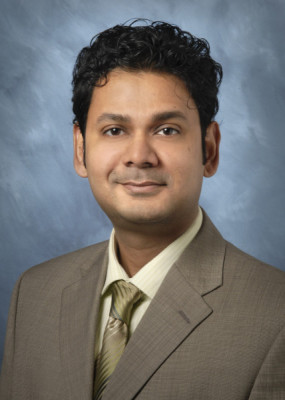Research Town Hall Spotlights New Human Microbiome Research Institute, Access to EIS Programs
Attendees at the Quarterly Event Learned How to Partner With Cedars-Sinai’s Human Microbiome Research Institute and Research EIS Enterprise
More than 100 faculty members who attended Cedars-Sinai’s April Research Town Hall—hosted by Jeffrey A. Golden, MD, executive vice dean of Research and Education and director of the Burns and Allen Research Institute at Cedars-Sinai—learned how to best collaborate with the newly created Human Microbiome Research Institute and the Research section of the Enterprise Information Systems (EIS) division.
Research and Education and director of the Burns and Allen Research Institute at Cedars-Sinai—learned how to best collaborate with the newly created Human Microbiome Research Institute and the Research section of the Enterprise Information Systems (EIS) division.
Guest speakers included Suzanne Devkota, PhD, director of the new Human Microbiome Research Institute and associate professor of Medicine and Biomedical Sciences, and Mahendra Yatawara, associate director of Research Informatics in EIS’ Research Informatics and Scientific Computing Core.
New Human Microbiome Research Institute
Devkota outlined the twofold mission of the Human Microbiome Research Institute.
“We aim to reduce barriers to entry in microbiome-based research through technical, educational and collaborative programs,” she said. “We also want to advance the microbiome field by generating mechanistic, human data across disciplines that leverage the unique strengths of the relationships between clinicians and basic scientists at Cedars-Sinai.”
Devkota also reviewed the goals of the program, including:
- Supporting microbiome research needs for faculty and trainees through expanded core infrastructure.
- Educating the research community in microbial sciences through workshops, seminars, dedicated consultations and internships.
- Innovating in key areas of microbiome science through tool development, industry partnerships and commercialization.
The expanded offerings include several services and resources important for microbiome research, which Devkota encouraged faculty and their colleagues to engage. Those include germ-free and gnotobiotic mice, microbiome sequencing, bacterial cultivation and archiving, study design consultation, and sample procurement.
Email Inquiries should be sent to microbiomeresearch@cshs.org, and additional information can be found at www.cedars-sinai.edu/hmri.
Resources Offered by Research EIS Team
Yatawara’s presentation shared information on the many available resources offered by the Research EIS enterprise to support Cedars-Sinai investigators.
investigators.
“I encourage researchers with specific needs who feel that there are technologies and tools that are absent at the organization to please reach out to me so we can collaborate to better understand and support all investigators,” said Yatawara. “Many research tools and technologies can be acquired in bulk, enabling the transfer of cost-savings back to the researcher. For special research projects that require nonstandard technologies, we encourage partnering with us to ensure that researchers do not face any specific delays or roadblocks along the way.”
Scheduling an up-front consultation with EIS Research, Yatawara said, would provide many efficiencies in allowing the team to guide researchers on the appropriate path.
The EIS Research team consists of data, programming, application and systems professionals who are dedicated to supporting and advancing the research efforts happening at Cedars-Sinai. The team collaborates with all EIS teams to deliver technology and service priorities that are defined by both the Strategic Prioritization Council and the EIS Advisory Committee.
Research applications and technologies offered through EIS Research include:
- Service Center: offers search and an EIS knowledge base for all IT-related items at https://servicecenter.csmc.edu
- EIS Research intranet site: offers a comprehensive listing of all services at https://intranet.cshs.org/sites/EISResearch
- High-performance computing (HPC): a total of four clusters comprising 5,406 cores, 26 GPUs, and 88.3 TB of RAM and producing over 450 TFLOPS of processing capability
- Research storage and virtual servers: offer over 5 petabytes of Isilon storage with redundancy available for research; cloud storage on Amazon Web Services, with short-term and long-term storage availability; data cataloguing, moving and automation via Starfish software, with per-user and per-lab reporting; and Microsoft OneDrive storage in HIPAA compliant environment
- Clinical trials management through OnCore: a secure, web-based, comprehensive system for managing clinical trials
- Search Clinical Trials: a tool that allows patients to search for active clinical trials available at Cedars-Sinai. The website is publicly available and can be found at https://clinicaltrials.cedars-sinai.edu
- LabVantage: a powerful lab information-management system that integrates with instruments and systems to enable proactive biospecimen data management and monitoring
- Los Angeles Data Resource: providing de-identified patient counts from five organizations—including Cedars-Sinai, UCLA, University of Southern California, City of Hope and Children’s Hospital Los Angeles—as well as data inclusive of demographics, ICD codes, medications and labs
- Deep 6: artificial-intelligence software that analyzes structured and unstructured CS-Link data, as well as physicians’ notes, pathology reports and surgical notes
- eRegulatory–Florence eBinders: an industry standard eRegulatory solution for clinical trial recordkeeping. The platform simplifies and streamlines the process for managing trial documents, allowing users to organize, track and access trial records securely over the internet. It can be found at https://researchbinders.com
- SymplecticElements: allows academic faculty to build a public profile by aggregating all their research outputs—publications, grants, and professional and teaching activities. It can be found at https://researchers.cedars-sinai.edu
CS-IACUC Launches June 3
Golden also gave attendees several logistical updates, including a reminder about the introduction of the new Institutional Animal Care and Use Committee (IACUC) program, CS-IACUC. Beginning June 3, the new system will replace the current Webridge IACUC platform.
Key details about CS-IACUC:
- Wednesday, April 24, is the final deadline for new study submissions in Webridge. Studies submitted by this deadline will be on track for review at the May IACUC meeting.
- Studies in Webridge that are not submitted by April 24 must be entered in CS-IACUC after Monday, June 3, and submitted by the Friday, June 14, deadline for the July IACUC meeting.
- No new amendments will be accepted in Webridge between Friday, May 3, and Monday, June 3.
- Training sessions are scheduled, and questions should be directed to Ajay Sagar at ajay.sagar@cshs.org.




